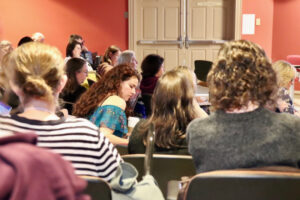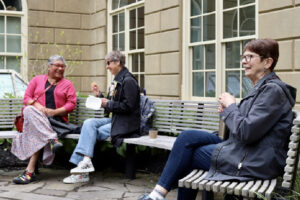From May 30 to June 1, over a hundred writers gathered on campus for King’s first-ever Creative Writing and Storytelling Conference. Hosted by the Writing & Publishing MFA programs, the inaugural conference explored the theme of curation, examining how storytelling drives curation and how curation, in turn, functions as a form of storytelling.
Throughout the weekend, participants had the chance to sit in on nearly two dozen sessions and workshops, delivered by presenters who each shared a unique spin on the theme—from current MFA student Peter Winfield, who discussed how trauma can impact our ability to curate stories in healthy ways, to Creative Nonfiction MFA Mentor Lorri Neilsen Glenn and Cohort Director Kim Pittaway, whose joint session guided participants through an activity to uncover the complexities of memory and the fragmented ways we remember moments.
Enzo Le Doze, MFA’25, kicked off the conference with a “Crash Course in Linguistics for Sci-Fi and Fantasy Writers,” which he began by asking who, like him, had graduated the day before. A scattered but substantial group raised their hands, highlighting a fresh crop of alumni from King’s MFA programs in attendance and eager to continue learning even after receiving their degrees.
 The audience took detailed notes and laughed as Le Doze added a humorous twist to linguistics, showing how through breaking down its features, inventing a language might not be as complicated as it sounds. “The average person uses around 800 unique words a day, which is both sad and impressive, but shows you really don’t need that many words for your book to work out.” There was no shortage of questions afterwards—from ideas to code a language generation product to wondering what should come first: the character or the language? Le Doze cautioned that if you’re focusing too much on the language, you’re not writing a novel, “you’re writing a linguistics book.”
The audience took detailed notes and laughed as Le Doze added a humorous twist to linguistics, showing how through breaking down its features, inventing a language might not be as complicated as it sounds. “The average person uses around 800 unique words a day, which is both sad and impressive, but shows you really don’t need that many words for your book to work out.” There was no shortage of questions afterwards—from ideas to code a language generation product to wondering what should come first: the character or the language? Le Doze cautioned that if you’re focusing too much on the language, you’re not writing a novel, “you’re writing a linguistics book.”
For Le Doze, presenting at the conference was a way to gain relevant experience to propel his career. “I have the goal of ending up teaching writing,” he said. “It’s a great idea from the department to provide us with opportunities to develop our resumes.”
On Sunday, Heather Bell, MFA’25, led another session that garnered laughter as she asked audience members to swallow their embarrassment and participate in the “MFA of silly walks,” an activity that encouraged participants to walk in the silliest ways they could imagine. After only a few minutes, participants shared how they felt happier, looser and more creative: fitting for Bell’s session about using physical activity to boost creativity.
Afterwards, Bell was encouraged to pitch her workshop to additional audiences. “It was a nice chance to have you all as guinea pigs,” she shared, adding how valuable it was to present in front of a new audience. “At the end of my presentation, two separate people gave me books they thought would be relevant and to continue reading … it helps having someone hear what you’re doing and give you that personal recommendation.”
“I’m really glad we were able to create an event where people could fill themselves up … Clearly, there’s a hunger for it.”
As the conference unfolded, it was clear that the benefit of being in a shared space with other writers extended well beyond book recommendations. Julie Katharine Strong, whose presentation centred on curating stories of resilience, began her session by acknowledging “how inspiring it is to be among fellow writers.” The audience received the sentiment with an appreciative round of applause.

Between sessions, writers gathered to enjoy coffee, cookies and community. They shared goals, experiences and the collective sentiment that writing, though often done alone, shouldn’t be done in isolation. After the final session concluded, participants milled about for over an hour, forming new connections and rekindling old ones.
“A lot of connections have been made, even people I maybe didn’t formally interact with, I would feel comfortable emailing, telling them that I met them at the conference or that I saw their talk and would like to ask a question,” said Jaime Wertman, BSc(Hons)’12, who registered for the conference after seeing an ad on Facebook. “I did the Foundation Year Program at King’s … so I knew the university and the type of thinking that goes on here…. This was my first creative writing academic experience, and I think it was positive overall.”
Director of Writing & Publishing Dr. Gillian Turnbull, MFA’17, was the primary organizer of the conference. When asked if she thought there would be another conference next year, she answered ‘yes’ without hesitation. “Clearly, there’s a hunger for it,” she said, reflecting on the volume of registrations. “I’m really glad we were able to create an event where people could fill themselves up.”
Turnbull’s parting words for writers? “Go home and write. It really was inspiring, so if we can carry that energy, even into the next few days, some really good writing is going to come out of it.”

